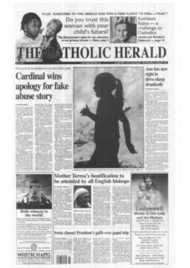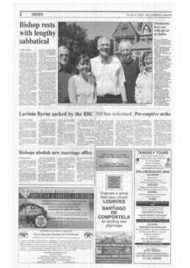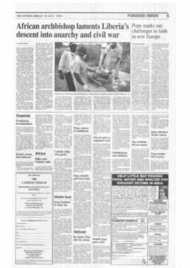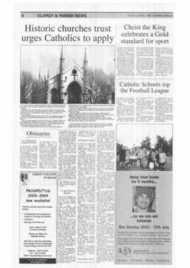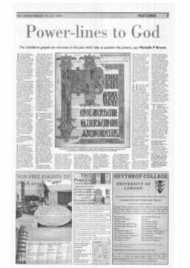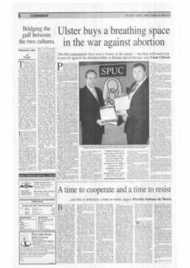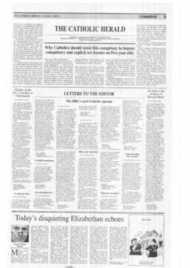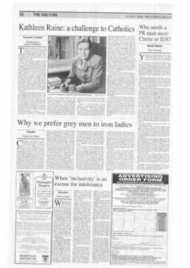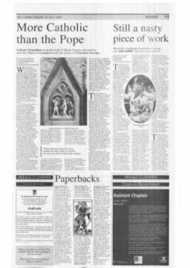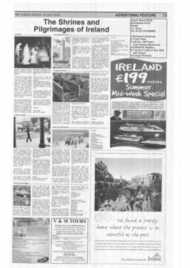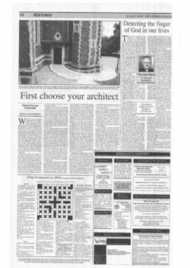Page 9, 18th July 2003
Page 9

Report an error
Noticed an error on this page?If you've noticed an error in this article please click here to report it.
Tags
Share
Related articles
Commission Freezes Charity Bank Accounts
The English Distrust The Work's Spanish Ways
Why The Jesuits Need Their Old Business Plan
Important Letters From Frank
Effectiveness Of The Cursillo Movement
Today's disquieting Elizabethan echoes
David Twiston Davies
Michael Woods's four-part docu mentary In Search of Shakespeare, which ends this Saturday on Channel 4, offers a gratifying wealth of detail about the richly Catholic environment in which the play
wright was brought up. Yet it also shows what a confused and dangerous place Elizabethan England was for Catholics then; and it has some worrying implications for us now. The general unease of a society where illness, famine and random violence were commonplace was exacerbated by a Queen who ascended the throne after 40 years of sporadic bloody change, determined to force a new religious settlement on a society that had been known for its Catholic piety.
Watching the pixie-like Woods scurrying around the country examining the occasional document and questioning such experts as Richard Wilson of Lancaster University, one realised that the programme could never cover all the questions involved. But it made plain why young "Maister WS"(sic) ignored pleas from his martyr kinsman St John Southworth to concentrate on religious themes, and instead focused on pleasure, keeping his political views to himself.
I found myself becoming uneasily aware that the seachange effected by the Elizabethan political "establishment" had a striking similarity to the methods employed by our modern government. Woods may be wrong in believing that Shakespeare started as an actor with the Queen's Men rather than the Catholic Stanley company. But the way the Queen's Men were sent around the country to peddle a pro-Protestant message had an uncanny echo of the "spinning" techniques that have been employed in favour of
the European Union. Of course, comparisons between two societies more than 400 years apart can easily be exaggerated; modern British governments do not employ the rack to deal with political opponents. Nevertheless, the most casual familiarity with the Elizabethan govenunent's habit of trampling on legal protections creates muted confidence in the value of novel human rights legislation, particularly when ministers want to introduce identity cards and would like to dispense with jury trials as unjustifiably expensive luxuries.
There is also the old question of whether Catholics can distinguish between their tem
poral and spiritual duties towards Queen and Pope. It was effectively proved that they could when they declined to recognise that they were under obligation to support the Spanish Armada: the Queen's naval commander was a Catholic, and students at the English College in Rome cheered when they heard of its defeat. But this did not stop most of our ancestors being pressured into letting their faith fall away in succeeding generations.
• Although few Protestants today would claim that the Pope demands obedience in political matters, the old dilemma continues to hover. Our bishops periodically urge us to suppon the European Union, though they never apply pressure; and even the
Holy Father is becoming alarmed at the prospect of the new EU constitution. inspired by the rationalist Enlightenment than the Christian tradition nurtured over many centuries. More worrying is the growing division with the rest of our society over ethical matters relating to the declining value attached to the sanctity of human life. These are issues which we must expect to confront as members of the only Church to take a consistent line. The obvious response to such concerns is that we have "civilised values" now, but Shakespeare's plays show how "the canker of our nature" can ooze out of men's hearts.
David Twiston Davies works for The Daily Telegraph
blog comments powered by Disqus


